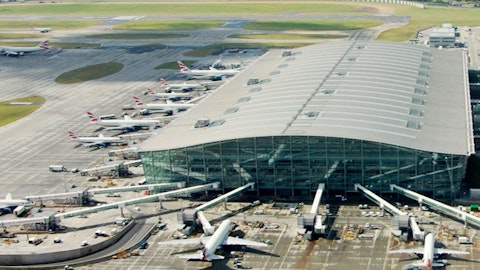Ricardo Duenas: Sorry. Could you repeat the first part? Could you repeat the first part, Fernanda? There was bad communication. Could you repeat it, please?
Fernanda Recchia: Yes. No, sure. I just wanted to understand the rationale of the government to apply this 10% of extraordinary discount. Was it just because if you don’t apply it, you would probably surpass the maximum rate or it is a measure to incentivize to lower air tariffs? This is the first one. And then I make my second one.
Ricardo Duenas: I think it was hard to speak on the rehab, but I think that the rationale is trying to incentivize.
Fernanda Recchia: All right. No, because you mentioned that you’re expecting to reach 97% of maximum rate. So in the end, it’s just a 3% discount on your regulated revenues, right? Is it correct to make this assessment?
Ricardo Duenas: Yes, we will be slightly above 97%. The reason is this for this year, it will only be two months and that 97% accounts for the whole year.
Fernanda Recchia: Right. And second, still on this topic. We know that this is a nearly discount. Could you give us a sense of how much discount did you apply last year just for a reference for us to see if this 10% is in line with historical average?
Ruffo Perez Pliego: We, from time to time, enter into agreements for new route openings and other strategies with airlines. But we haven’t had general discounts such as these for many years.
Fernanda Recchia: Okay. Thank you.
Operator: Our next question comes from the line of Alan Macias with Bank of America. Please proceed with your question.
Alan Macias: Hi. Good morning and thank you for the call. I just have, I guess, two questions. And one clarification. The TUA represents what percentage of aeronautical revenue? And the second question would be on the expected higher CapEx for the Acapulco Airport and would that be incorporated into the new Master Development Program or before? Thank you
Ricardo Duenas: On the second part, we’ve been in very close coordination with the government for Acapulco. We still don’t know the size of the damage. We know that the core part for operating the airport is okay. Obviously, terminal has suffered some damages. On our last conversation with the government, they are very open to work closely to how can we offset the impact from the hurricane in our CapEx. And for the TUA, it represents 89% of our aeronautical revenues.
Alan Macias: And just one more question. On the engine recall impact, any impact you have seen as of October during October? Thank you.
Ruffo Perez Pliego: Yes. We have seen that the scale sheets in databases such as OAT have been trending down over the last month or so. So, yes, we do believe that what is reflected right now in the system is already incorporating what’s known of the recall of brand Whitney engines at least for the winter season.
Ricardo Duenas: We also — we know that the airlines are taking a lot of measures to try to offset this impact. We know they are trying to extend leases, trying to extend the life of some of their other aircraft. So let’s — in the last couple — in the next two months, we will have more clarity what will be the real impact next year.
Alan Macias: Thank you.
Operator: Our next question is a follow-up question from the line of Bruno Amorim with Goldman Sachs. Please proceed with your question.
Bruno Amorim: Yes. I just wanted to clarify one specific point. What leverage or what that specifically will be considered for the calculation of the cost of capital is the debt at the moment of the MDP discussion, is it a five-year average? And also to the extent that you might have corporate that or in the event that you invest abroad and you have that attached to it. Will they look just at the debt at the asset level in Mexico or will they look at OMA as a whole? Thank you very much.
Ruffo Perez Pliego: I think in the basis that we published there are some debt to capital ratios that are averages that includes other airport groups as well. And it’s only that related to assets in Mexico and it excludes that is not funding operations in Mexico.
Operator: There are no further questions in the queue. I’d like to hand the call back to management for closing remarks.
Ricardo Duenas: Thank you all for participating today. Ruffo, Emmanuel and I are always available to answer your questions, and we hope to see you soon. Thank you and have a good day.
Operator: Ladies and gentlemen, this does conclude today’s teleconference. Thank you for your participation. You may disconnect your lines at this time and have a wonderful day.
Follow Grupo Aeroportuario Del Centro N (NASDAQ:OMAB)
Follow Grupo Aeroportuario Del Centro N (NASDAQ:OMAB)
Receive real-time insider trading and news alerts



